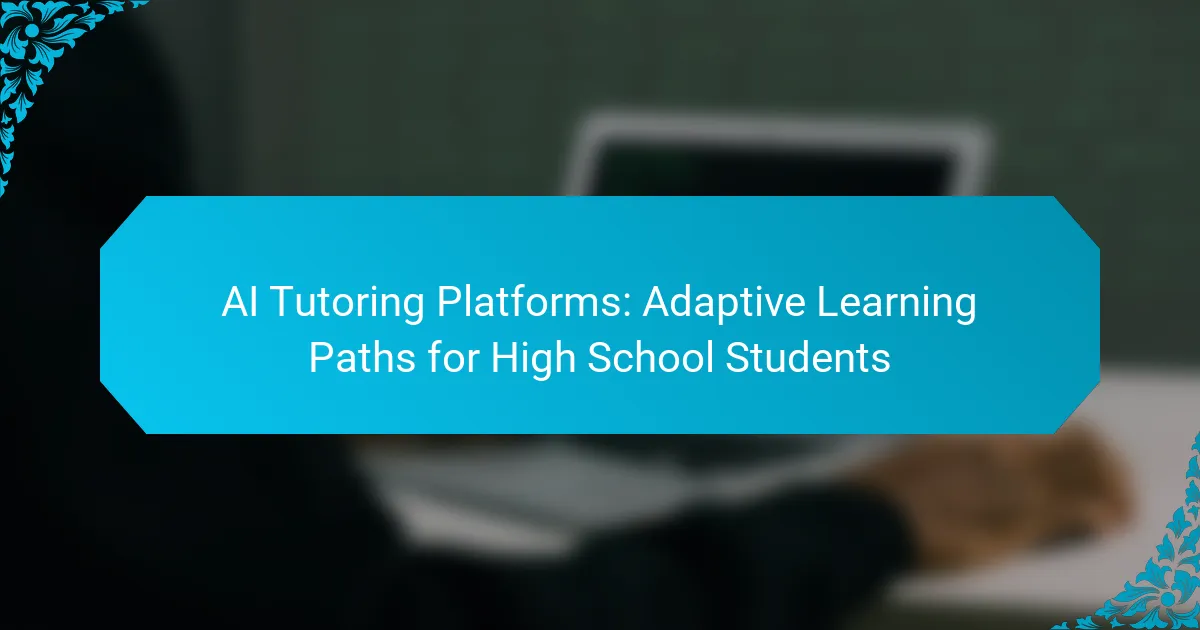AI tutoring platforms for high school students provide personalized learning paths that adapt to each student’s unique needs. By leveraging advanced algorithms and data analytics, these platforms create tailored educational experiences, enabling students to master complex subjects at their own pace and improve overall learning outcomes.
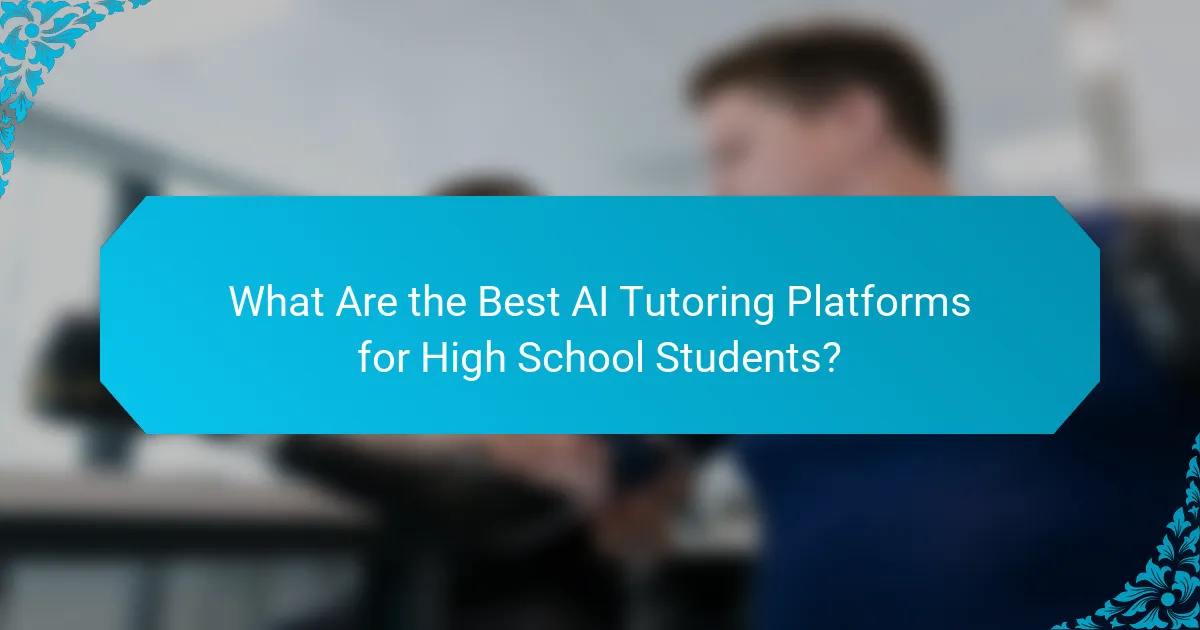
What Are the Best AI Tutoring Platforms for High School Students?
The best AI tutoring platforms for high school students offer personalized learning experiences that adapt to individual needs. These platforms utilize advanced algorithms to tailor educational content, helping students grasp complex subjects at their own pace.
Khan Academy
Khan Academy is a widely recognized platform that provides free educational resources across various subjects. Its AI-driven system adapts learning paths based on student performance, allowing for a customized experience that addresses each learner’s strengths and weaknesses.
Students can track their progress through interactive exercises and instructional videos. The platform is particularly effective for math and science subjects, making it an excellent choice for high school students aiming to improve their understanding in these areas.
Coursera
Coursera partners with universities and organizations to offer a range of courses, including those tailored for high school students. Its AI features help recommend courses based on a student’s interests and previous learning experiences.
While many courses are free, some require payment for certification. Students can benefit from high-quality content and the opportunity to learn from industry experts, making it a valuable resource for advanced learners looking to supplement their education.
Edmentum
Edmentum focuses on personalized learning solutions that cater specifically to K-12 students. Its platform uses adaptive assessments to create customized learning paths, ensuring that students receive the right level of challenge.
This platform is particularly beneficial for students needing extra support or those preparing for standardized tests. Edmentum also offers a variety of courses aligned with state standards, making it suitable for students across the United States.
Smart Sparrow
Smart Sparrow is an adaptive elearning platform that emphasizes interactive learning experiences. It allows educators to create customized courses that respond to student input, making learning more engaging and effective.
This platform is ideal for high school teachers looking to enhance their curriculum with personalized content. Students benefit from immediate feedback and adaptive learning paths that adjust based on their performance, fostering a deeper understanding of complex subjects.
DreamBox Learning
DreamBox Learning specializes in math education for students from kindergarten through high school. Its AI technology adapts lessons in real-time, responding to student actions and providing immediate feedback.
The platform is designed to promote mastery of math concepts through engaging, game-like activities. DreamBox is particularly effective for students who may struggle with traditional math instruction, offering a supportive and interactive learning environment.
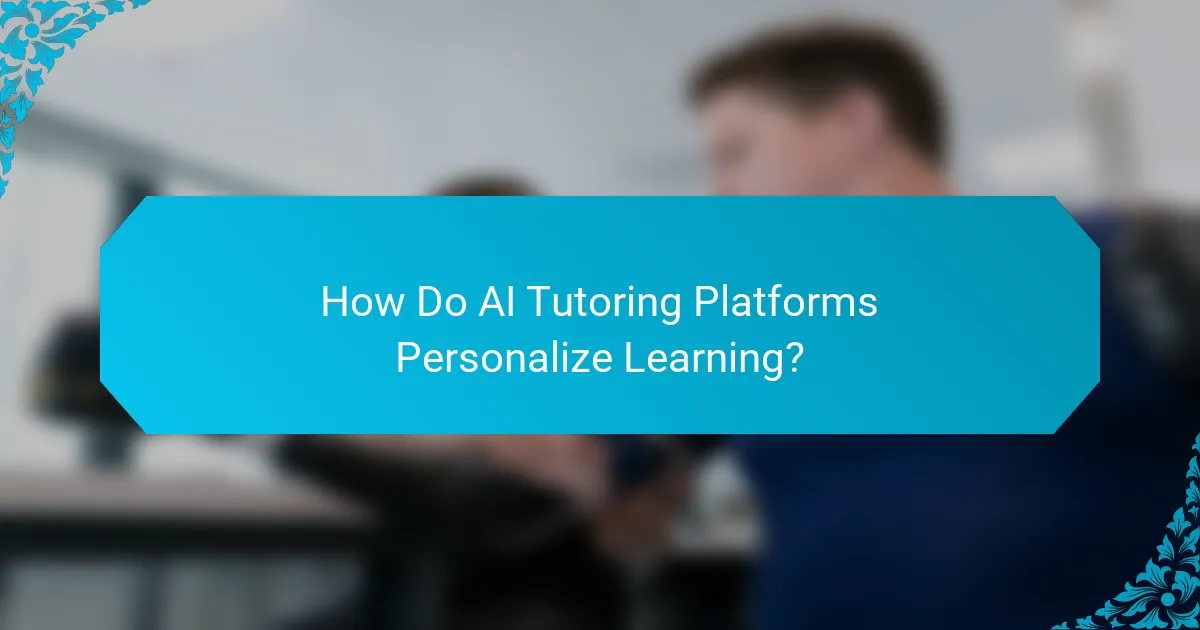
How Do AI Tutoring Platforms Personalize Learning?
AI tutoring platforms personalize learning by using advanced algorithms to tailor educational content and experiences to individual student needs. This customization enhances engagement and improves learning outcomes by adapting to each student’s pace and understanding.
Adaptive Learning Algorithms
Adaptive learning algorithms analyze a student’s performance in real-time to adjust the difficulty and type of content presented. For instance, if a student struggles with algebra, the platform may provide additional practice problems or alternative explanations until mastery is achieved.
These algorithms often utilize machine learning techniques to continuously refine their approach based on user interactions. As students progress, the system evolves, ensuring that the learning path remains challenging yet achievable.
Data-Driven Insights
Data-driven insights are crucial for identifying patterns in student learning behaviors and outcomes. By collecting data on quiz scores, time spent on tasks, and engagement levels, AI platforms can pinpoint areas where a student excels or needs improvement.
Educators can leverage these insights to provide targeted support, ensuring that interventions are timely and relevant. For example, if a student consistently performs well in geometry but struggles with statistics, the platform can recommend focused resources to address that gap.
Real-Time Feedback
Real-time feedback is a key feature of AI tutoring platforms, allowing students to receive immediate responses to their answers. This instant feedback helps reinforce learning by correcting misconceptions and guiding students toward the right solutions.
For effective learning, feedback should be constructive and specific. Instead of simply indicating a wrong answer, the platform might explain why the answer is incorrect and provide hints or resources to help the student understand the concept better.
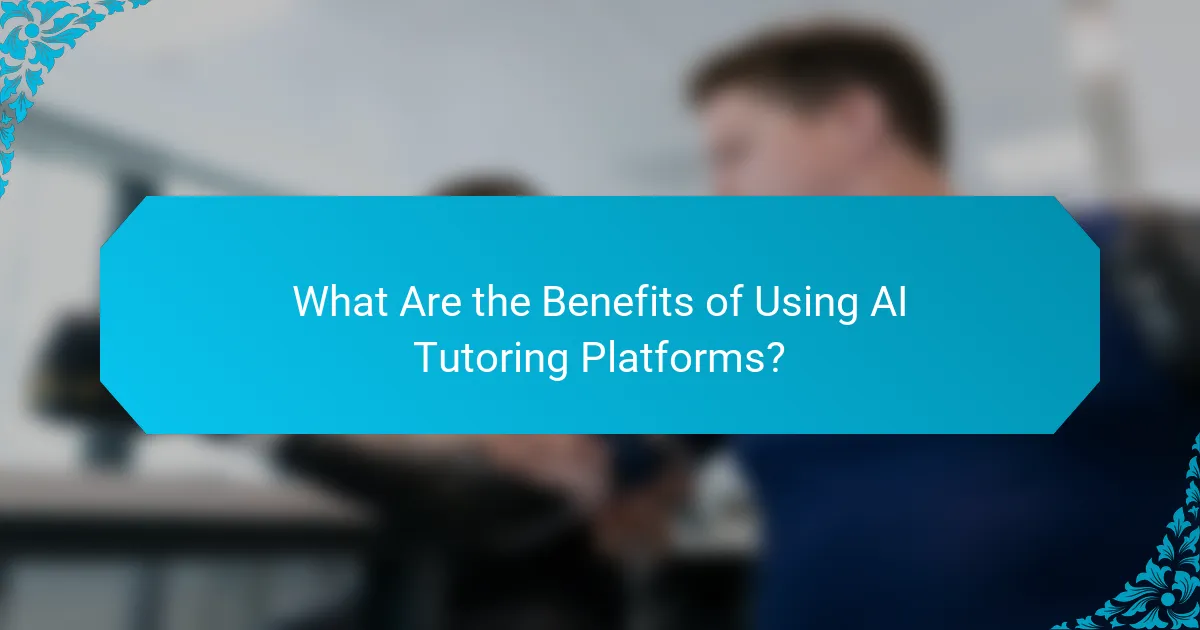
What Are the Benefits of Using AI Tutoring Platforms?
AI tutoring platforms offer personalized learning paths that adapt to the unique needs of high school students, enhancing their educational experience. These platforms leverage data analytics and machine learning to create tailored content, helping students grasp complex subjects more effectively.
Customized Learning Experiences
AI tutoring platforms provide customized learning experiences by assessing individual student performance and preferences. This allows the system to adjust the curriculum in real-time, offering resources that align with each student’s strengths and weaknesses.
For example, if a student struggles with algebra but excels in geometry, the platform can increase focus on algebraic concepts while providing advanced geometry challenges. This targeted approach ensures that students are neither bored nor overwhelmed.
Increased Engagement
Engagement levels often rise with AI tutoring platforms due to their interactive and adaptive nature. These platforms frequently incorporate gamification elements, such as rewards and challenges, which make learning more enjoyable and motivating for students.
Additionally, real-time feedback keeps students informed about their progress, encouraging them to stay committed to their studies. Engaged students are more likely to participate actively in their learning journey, leading to better retention of information.
Improved Academic Performance
Research indicates that students using AI tutoring platforms can see improved academic performance, often reflected in higher grades and test scores. By providing personalized support and resources, these platforms help students master difficult concepts at their own pace.
Schools and educators can track progress through analytics provided by the platform, allowing for timely interventions when necessary. This proactive approach helps ensure that students do not fall behind, ultimately fostering a more successful educational experience.
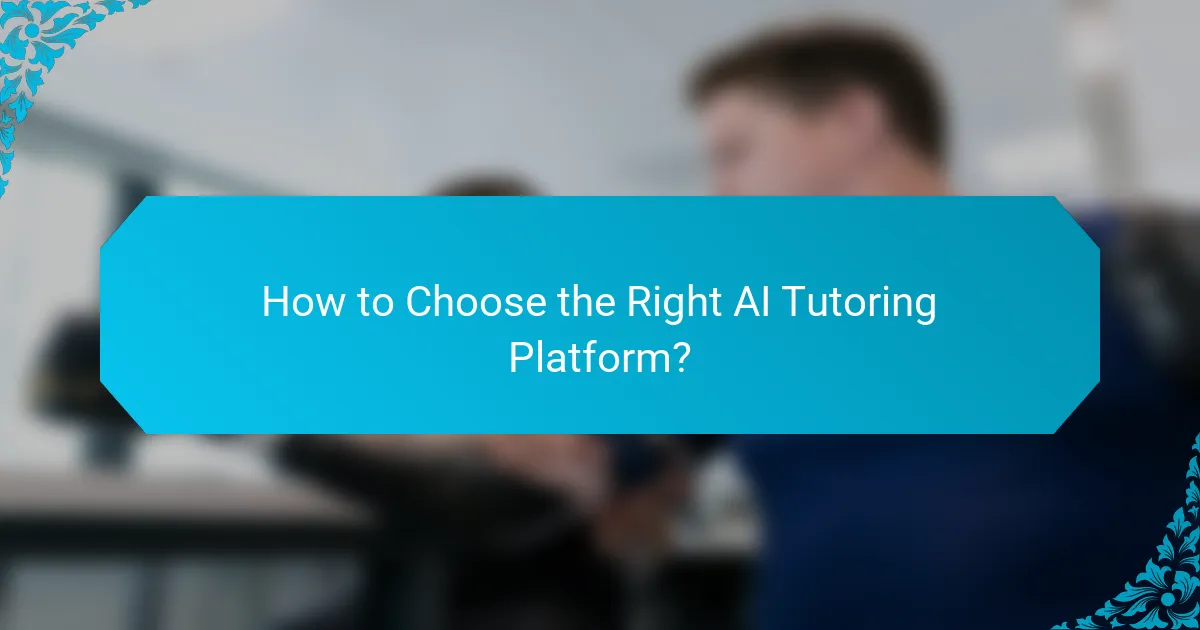
How to Choose the Right AI Tutoring Platform?
Selecting the right AI tutoring platform involves understanding your specific learning needs, evaluating the features of different platforms, and considering your budget. A well-chosen platform can significantly enhance a high school student’s learning experience through personalized education paths.
Assess Learning Needs
Begin by identifying the specific subjects and skills your student needs help with. Consider their strengths and weaknesses, as well as their preferred learning style, whether visual, auditory, or kinesthetic. This assessment will guide you in selecting a platform that offers tailored content.
Utilize diagnostic assessments or quizzes available on many platforms to gauge the student’s current knowledge level. This can help in creating a personalized learning path that addresses gaps and builds on existing knowledge.
Evaluate Platform Features
Look for platforms that offer adaptive learning technologies, which adjust the difficulty and type of content based on the student’s performance. Features such as progress tracking, interactive exercises, and real-time feedback are essential for effective learning.
Consider additional resources like video tutorials, practice tests, and forums for peer interaction. A user-friendly interface and mobile accessibility can also enhance the learning experience, making it easier for students to engage with the material anytime, anywhere.
Consider Budget and Pricing
AI tutoring platforms vary widely in cost, ranging from free options to subscription models that can be several hundred dollars per year. Determine your budget and compare the pricing structures of different platforms to find one that offers the best value for the features you need.
Some platforms may offer free trials or tiered pricing based on usage, which can be beneficial for testing the service before committing. Be cautious of hidden fees or costs for additional resources that may not be included in the initial price.
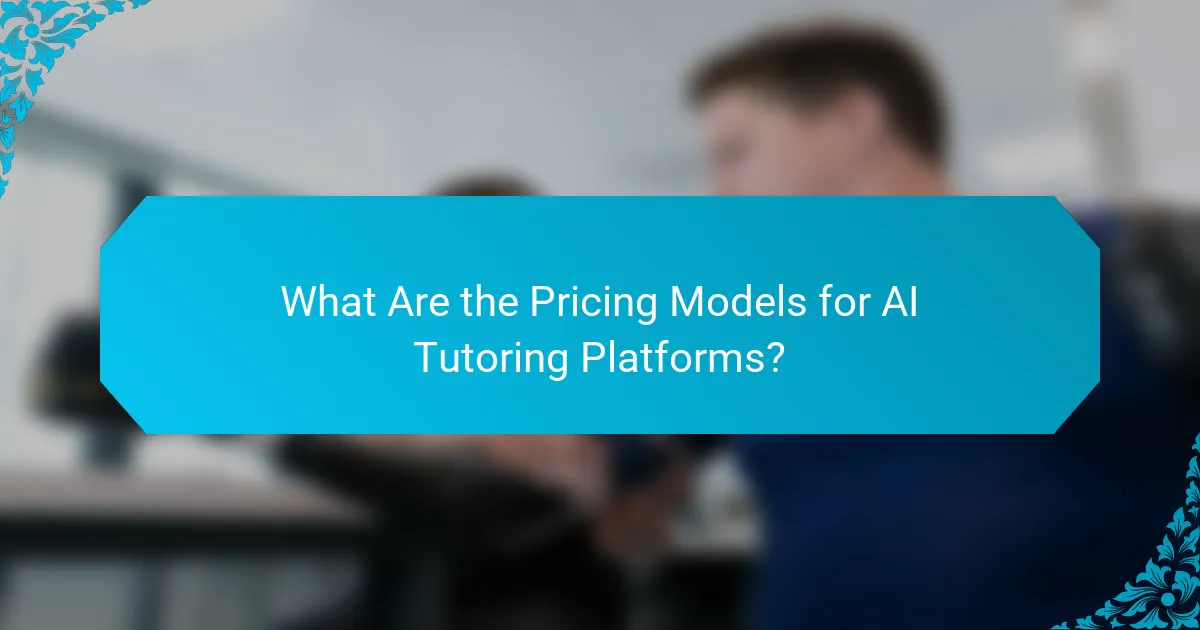
What Are the Pricing Models for AI Tutoring Platforms?
AI tutoring platforms typically offer various pricing models, including subscription-based, pay-per-session, and freemium options. These models cater to different user needs and budgets, allowing high school students and their families to choose the most suitable plan.
Subscription-Based Pricing
Subscription-based pricing is a common model where users pay a recurring fee, often monthly or annually, for access to the platform’s resources. This model usually provides unlimited access to tutoring sessions, learning materials, and progress tracking features. Families can expect to pay anywhere from $20 to $100 per month, depending on the platform’s offerings.
One advantage of this model is cost predictability, as users know their expenses upfront. However, it’s essential to evaluate the platform’s content and support to ensure it meets educational needs before committing to a subscription.
Pay-Per-Session Pricing
Pay-per-session pricing allows users to pay only for the tutoring sessions they use, making it a flexible option for those who may not need regular tutoring. Prices for individual sessions can range from $10 to $50, depending on the tutor’s expertise and the platform’s features.
This model is beneficial for students who require occasional help or prefer to learn at their own pace. However, it can become costly if frequent sessions are needed, so it’s crucial to assess the overall learning plan and budget accordingly.
Freemium Models
Freemium models offer basic access to the platform for free, with the option to upgrade to a paid plan for additional features or resources. This model allows students to explore the platform’s capabilities without financial commitment initially.
While freemium options can be a great way to test a platform, users should be aware of the limitations of free access. Often, essential features like personalized tutoring or advanced analytics are locked behind a paywall, so it’s wise to evaluate whether the free version meets educational goals before considering an upgrade.
